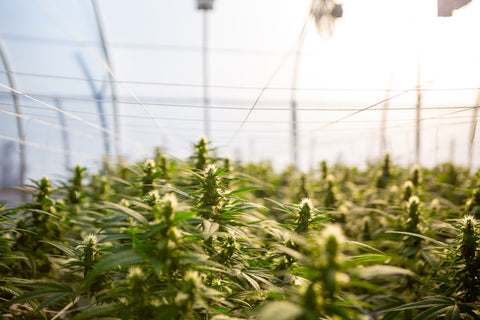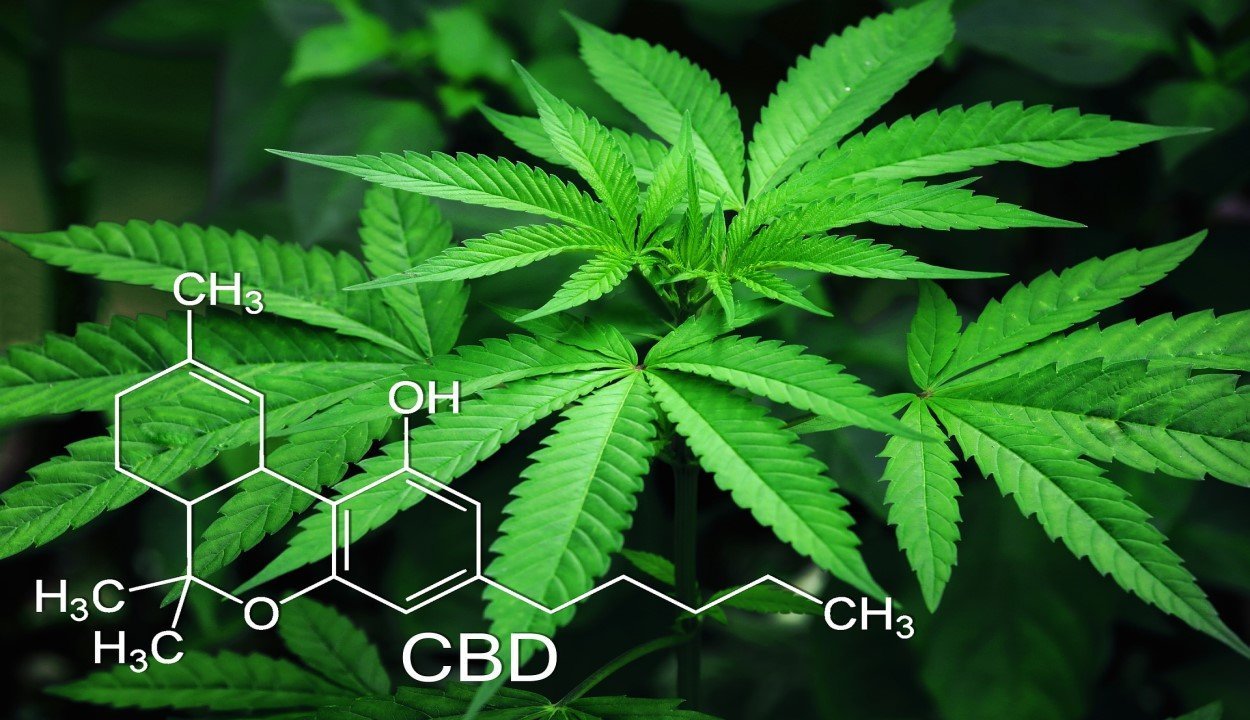Your Cart is Empty
FREE SHIPPING ON ALL ORDERS $75+
CBD, short for "Cannabidiol," is the second most prevalent phytocannabinoid found in Cannabis.
CBD can be found in the leaves and stems of cannabis plants but is most concentrated in the trichomes (hair-like structures) found on the plant’s flowers.
Generally, CBD has been labeled as “safe” and “non-addictive,” leading to research regarding its therapeutic potential in the case of various chronic conditions. Although most of this research is still in its preliminary stages, CBD (specifically prescription CBD medications) as a treatment for seizures has been extensively studied and is widely accepted.
In previous years, the CBD molecule has been used or recreated in various pharmaceutical applications. Now, thanks to an update in the hemp farming legislature, CBD products are more readily available even without a prescription.
For now, we know very little about CBD compared to THC, the psychoactive cannabinoid found in cannabis. Thankfully, the increase in availability and interest surrounding CBD has also motivated new research efforts about the medicinal effects of CBD.
Unfortunately, it can be hard to understand the new evidence that’s emerging, and even more difficult to decipher fact-based information from the many bold, unbacked claims made by less-than-reliable CBD manufacturers.
Don't worry, though!
We’ll cover everything you need to know about CBD, where it comes from, and how and why it’s used down below.
Table of Contents
How is CBD Different Than Marijuana?
CBD vs Other Cannabinoids
Is CBD Legal?
How Does CBD Work?
Potential Benefits of CBD
Pharmaceutical Uses of CBD
How is CBD Used?
Does CBD Have Any Side Effects?
Is CBD Safe?
Key Takeaways
Resources
Marijuana, or the type of cannabis plants that cause psychoactive effects, is characterized by its high THC content and usually low CBD content. THC is the cannabinoid responsible for the psychoactive high related to cannabis and marijuana products.
CBD and THC are closely related, and evidence suggests that both may have significant therapeutic properties.
Unlike THC, though, CBD doesn't cause psychoactive effects. This gives CBD a significant advantage because consumers can reap the therapeutic benefits without feeling high.
In fact, some evidence suggests that CBD is an antagonist for THC. That means that CBD can potentially lessen the effects of THC, including negative effects like paranoia.
For that reason, high CBD marijuana strains have also been created. These strains may sometimes be used to harvest raw material to make full spectrum CBD or CBD isolate products, but it isn’t common.
Most often, CBD products are made from cannabis strains that are classified as “industrial hemp.”

Industrial hemp is a class of cannabis plants that contain less than 0.3% THC, where CBD is generally the most prominent cannabinoid.
Industry leaders rely on agricultural regulations regarding industrial hemp to help provide consistency between products and to ensure that THC levels remain below the legal limit.
The THC limit is important both to consumers and manufacturers since products containing over 0.3% THC are still federally classified as Schedule I Drugs.
We mentioned that CBD was the second most prevalent cannabinoid found in the cannabis plant family, but it earns that spot by a significant gap.
In industrial hemp strains, CBD is the most prevalent cannabinoid. CBD concentration varies by strain, but it’s usually somewhere between 8% and 15% of the total weight. Lesser-known cannabinoids appear in concentrations around 2% or less.
That’s not to say that other cannabis compounds are less important. Research has identified a selection of benefits related to lesser-known cannabinoids, like CBG and CBN, and terpenes, like pinene and myrcene.
In fact, one theory suggests that CBD, THC, and all other trace cannabinoids and terpenes may be more efficient when working as a group. This theory, called the “entourage effect," is the reason that many people choose full spectrum CBD products over CBD isolate.
CBD is derived from cannabis, a plant family that’s long fallen under the red tape of “restricted use." This leads many people to wonder if CBD is legal to make, sell, and buy.
Technically, cannabis strains classified as "industrial hemp" and all of their naturally occurring derivatives (like CBD) were declared legal for manufacture and sale in the U.S. under the 2018 Farm Bill.
However, the FDA has yet to step in to create rules and regulations regarding the manufacturing and sale of CBD as a dietary supplement. Therefore, CBD currently stands in a legal gray area.
In other words, there are no laws specifically prohibiting hemp farming or cannabinoid extraction, so long as the THC content is 0.3% or less.
On the other side of the coin, there are very few laws regarding the manufacturing process for hemp products.
What does that mean for consumers?
You have to be really careful when you buy CBD products, but it's definitely possible to find high-quality, legal CBD products. You may also need to check your local legislation.
Although industrial hemp products are legal across the country from a federal standpoint, states and cities may have their own individual rules on cannabinoid-based supplements.
The mechanisms through which CBD interacts with the body are complex, but to keep it simple CBD is thought to have a similar genetic structure to endocannabinoids, or a group of neurotransmitters found all throughout the body. 
Because of these similarities, CBD may interact with endocannabinoid receptors in the brain, skin, immune system, and major organs.
CBD may interact with this system, called the Endocannabinoid System (ECS), to help maintain balance in the body. The Endocannabinoid System is thought to have a hand in many major functions, like regulating pain, memory, mood, appetite, and immune functions.
In other words, CBD interacts with a bodily system that impacts almost every part of life. CBD is one piece to a huge puzzle that relies on a delicate balance of neurotransmitters, which is why the benefits of CBD are far reaching and hard to pinpoint.
Because of the many functions of the Endocannabinoid System, CBD is currently being investigated for a wide range of uses.
Focal points range from chronic pain and inflammation, to anxiety and depression and even to a variety of applications investigating cannabinoid-based cancer treatments.
Although clinical research is limited, an array of anecdotal reports extend the potential benefits of CBD to things like headaches, muscle pain, panic attacks, and more.
What do many of these conditions have in common?
Research suggests that a variety of treatment resistant syndromes may be linked to an endocannabinoid deficiency, or a natural deficiency in important neurotransmitters.
Most research is still in its infancy, but studies show that CBD may have potential in the following areas:
Although there is plenty of research surrounding the benefits of CBD, some of which dates back decades, legal restrictions have kept the pharmaceutical industry from advancing cannabinoid-based medicines until recently.
With new legal guidelines and increased access, CBD research is expected to continue to expand, leading to new approved pharmaceutical uses for CBD.
Although this wide reaching list of potential benefits is still being studied, there are several applications for CBD where we have more thorough evidence.
In fact, several FDA approved medications utilize cannabinoid therapy:
Epidiolex, a medication designed for treating seizures associated with two rare, severe forms of epilepsy (Lennox-Gastaut syndrome and Dravet syndrome), is made from pure CBD isolate and entered the market in 2018.
Sativex also gained FDA approval for clinical trials in 2018. The cannabinoid-based drug uses a formula with a 1:1 CBD to THC ratio to experimentally treat pain associated with Multiple Sclerosis.
Ongoing clinical research includes trials regarding the use of CBD for Post Traumatic Stress Disorder, Alzheimer’s Dementia, Autism Spectrum Disorder, and more.
With so many potential benefits, it's no surprise that the CBD market is incredibly expansive.
Many studies look at intravenous doses of CBD, while others rely on topical and oral applications.
Oral dosing is generally considered to be the most common way to take CBD. This is usually done with a CBD tincture, capsule, or edible.
Topical application is also a popular route, and studies have shown that there are plenty of endocannabinoid receptors in the skin.
CBD topicals range from basic lotions to topical creams enhanced with essential oils, herbs, and other additives to help promote healing, control pain, or target other specific ailments.
Alternatively, vaping CBD or smoking raw hemp flower is an effective way to intake CBD. Many people believe inhalation to be the fastest delivery system for cannabinoid-based supplements.
CBD manufacturers are constantly innovating new ways to take CBD, and the expansive market offers a lot of opportunity to create a personalized CBD routine.
Still, with so many choices and very little regulation within the industry, it's incredibly important to vet brands and products carefully to avoid low-quality, contaminated products that could cause adverse reactions.
Adverse reactions related to CBD products may be due to low-quality formulation and synthetic cannabinoids, which reinforces the importance of carefully vetting CBD brands before choosing a product. The FDA has already issued warning letters to some brands for false claims, inaccurate CBD levels, and more.
There is limited evidence regarding the side effects of high-quality CBD. One study suggests that CBD side effects are rare and mild, and the most common side effects are diarrhea, tiredness, and changes to weight or appetite.
CBD is generally regarded as having a solid safety profile and low-risk for adverse effects.
Just as research regarding the use of CBD is still underway, research efforts regarding safety and potential side effects are still expected to grow.
Of over 100 cannabinoids found in the cannabis family of plants, CBD is the second most common, next only to THC. Unlike THC, CBD poses no psychoactive effects, offering a great benefit to medicinal cannabis users.
Although the buzz surrounding CBD is new, the medicinal benefits of hemp and cannabis have been apparent throughout ancient history. Now, CBD products made according to the 2018 Farm Bill regulations are more accessible than ever.
Currently, the main challenge for consumers and manufacturers alike is the lack of regulation within the hemp industry. Due to these low regulations, consumers should take great precaution in choosing a trustworthy CBD manufacturer and high-quality product.
Currently, only one FDA approved CBD therapy exists for treating rare forms of epilepsy, and another FDA-guided trial is working to identify the benefits of a CBD and THC combination drug for Multiple Sclerosis and related pain.
Additional research suggests that there CBD has great therapeutic potential, and preliminary evidence covers a plethora of uses, including CBD as a treatment for anxiety, sleep disorders, psychiatric disorders, neuropathic pain, bowel disease, and more.
Still, there’s much left to learn about CBD and the way it interacts with the body via the Endocannabinoid System. Ongoing research hopes to identify the mechanisms through which CBD creates endocannabinoid balance in hopes of offering more insight to CBD consumers and manufacturers alike.
Comments will be approved before showing up.



